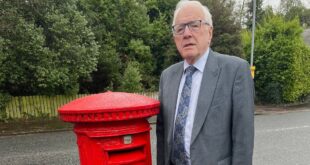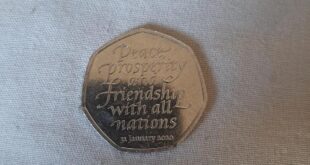Lucy Bell, former head of the First Nations Department and Repatriation Program at the Royal British Columbia Museum and Archives, seen here in Victoria on June 5, 2019.
DARRYL DYCK/The Globe and Mail
The Royal British Columbia Museum and Archives has hired a third-party investigator and brought in a diversity inclusion consultant after a prominent Indigenous staff member resigned, citing racism and a toxic workplace.
Lucy Bell, who was head of the First Nations Department and Repatriation Program, stepped down in July. In a farewell speech to her colleagues that month, she called for a zero-tolerance policy for racism at the Victoria-based museum, and called out staff and executives, citing examples of racist behaviour she has received and witnessed.
“There is outright discrimination. There’s white privilege. There’s bullying. There’s micro-aggressions that happen here every day. I have felt it a lot from executive, I have felt it a lot from my colleagues,” said Ms. Bell, who is Haida. The Globe and Mail has obtained a recording of the speech.
Ms. Bell said the last straw occurred during an anti-racism Zoom session, convened earlier this year as cultural institutions came under scrutiny for issues related to race. Bell said in her speech that she heard “racist” and “horrible” remarks during that session. In a subsequent interview, she told The Globe those remarks included an anecdote about alcohol use and Indigenous people, with one colleague saying, “It’s proven science that Natives can’t tolerate alcohol.”
She said during the speech that she also heard colleagues question the need to think about diversity or consult with First Nations communities when they were “so busy,” and that hiring Indigenous people constituted reverse racism. She said one co-worker told her: “I understand what you’re going through – I’ve been discriminated against for the colour of my hair for all my life.”
In another incident, after the Haida repatriation committee asked for two items from the RBCM collection, Ms. Bell said a museum staffer remarked: “The Haida cannot pick and choose artifacts for repatriation. They cannot treat this museum like a grocery store.”
Board chair Dan Muzyka, who watched a livestream of Ms. Bell’s speech from his home, says he was disappointed and saddened by what she said and that it was the first he had heard of the allegations. He says he mobilized the board immediately. The speech was on a Friday; plans were in the works by Monday.
“We’re committed to getting action,” Dr. Muzyka says.
The alarming allegations and resignation come at a time of reckoning at cultural institutions in Canada and beyond, as the Black Lives Matter movement has helped spur calls for change and highlighted issues that BIPOC staff, visitors and would-be staff have had to deal with. High-level departures have followed allegations of racism at the Canadian Museum for Human Rights and of a toxic workplace at the Montreal Museum of Fine Arts. In the U.S., there have been claims of racism at institutions including the Metropolitan Museum of Art in New York and Boston’s Museum of Fine Arts – run by former Art Gallery of Ontario director Matthew Teitelbaum.
Sharanjit Kaur Sandhra, a council member of the B.C. Museums Association who is doing her PhD examining critical race theory and museums, says she has found racism to be deeply entrenched within the museum sector. “Leaders in these institutes need to take ownership of their culpability in these toxic work spaces,” says Ms. Sandhra. “They have to own their complicity in it. You have to start from that place, because if the leadership won’t own it, nobody beneath them will.”
As a founding member of the Haida Heritage and Repatriation Society, Ms. Bell has co-ordinated the return of the remains of more than 500 Haida from museums in the U.K. and across North America, including from the RBCM. She joined the museum in 2017 as the inaugural head of the First Nations Department and Repatriation Program.
Among her early objectives was to change the way the ancestors were cared for at the museum – removing the bubble wrap and staples, rewrapping them in culturally appropriate fabric, and holding a ceremony with prayers.
In her goodbye speech, Ms. Bell told co-workers she was leaving for her personal well-being and cultural safety. “I’ve found that since I put in my resignation, there’s been a lot of finger-pointing – who caused this? You can’t point at one person. My friends, my colleagues, I want you to hear and feel my anger, my hurt, my shame, my frustration. I don’t want you to e-mail me later and explain yourself. I don’t want you to do further research to prove your points. What I want you to do is to accept your white privilege and do something about it. So that no other Black, Indigenous or person of colour has to go through this,” said Ms. Bell.
“Royal B.C. Museum, you have a long way to go to become anti-racist and to be a welcoming place for people of colour. I worry about our Indigenous communities coming here, I really do,” she continued. “I’m begging you to make some changes here. Mobilize your privilege and do something now. Be an anti-racist. Commit the time and the money and make really brave decisions, Jack.”
Jack is Jack Lohman, the museum’s chief executive officer. Mr. Lohman has been with the museum since 2012. Prior to that, he was director of the Museum of London, in the U.K.. He is also president of the Canadian Museums Association.
Mr. Lohman didn’t respond to an e-mail from The Globe on Thursday.
“I hope and pray that everyone here can commit to fixing this issue,” Ms. Bell said in her speech.
Dr. Muzyka told The Globe the organization wouldn’t wait until the results of the third-party investigation to begin implementing the diversity and inclusion programming. He said an evaluation and education process was beginning this month. The consultant will work with “the whole team, from top to bottom.”
The investigation is also underway. “There’s no limitation about who’s going to be interviewed,” says Dr. Muzyka. The investigator will follow the trail where it leads. “No one is outside of the investigation.”
Ms. Bell confirmed the remarks she made on the videotaped speech to The Globe and said she has since heard from some of her former colleagues. One asked her if perhaps this was her purpose at the museum: “to help them change, to help my colleagues have a stronger voice. And maybe it is. Not quite what I expected or wanted for my life,” Ms. Bell said in the interview.
She added she is hopeful for a positive outcome. “I think my colleagues know about me that I am always optimistic. I went to this museum because I saw the potential for change and growth; I still feel like that’s there. I hope they’re on the right path and are taking it seriously, and willing to make the changes so that my departure isn’t going to be in vain.”
As for Ms. Sandhra, she is a proponent of what she calls “naming and shaming” the museums and the perpetrators. “If you’re going to continue to silence, it’s not going to work,” she says. “Leaders need to say that those who have contributed to racist work spaces will be held accountable, and they need to feel a little bit of fear.”
She adds this is a universal problem, in no way limited to the RBCM. But she says she has heard allegations of racism from more than one employee of that institution since delivering a provocative webinar to the B.C. Museums Association earlier this year.
“I don’t care if you’re uncomfortable,” she said to those watching the live-streamed event. “Because for centuries, Indigenous, Black, people of colour have been in discomfort from the very spaces you work in, from the very spaces that you curate in and design exhibits in and collect artifacts in. We have been uncomfortable for centuries. So one hour of discomfort will do nothing to you. The real indication will be what you do with that discomfort going forward.”
The Globe has five brand-new arts and lifestyle newsletters: Health & Wellness, Parenting & Relationships, Sightseer, Nestruck on Theatre and What to Watch. Sign up today.
Source link



